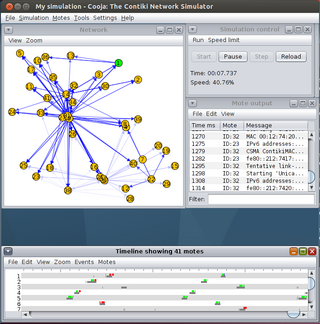Stack may refer to:
Stack may refer to:
In computer science, an abstract data type (ADT) is a mathematical model for data types, defined by its behavior (semantics) from the point of view of a user of the data, specifically in terms of possible values, possible operations on data of this type, and the behavior of these operations. This mathematical model contrasts with data structures, which are concrete representations of data, and are the point of view of an implementer, not a user. For example, a stack has push/pop operations that follow a Last-In-First-Out rule, and can be concretely implemented using either a list or an array. Another example is a set which stores values, without any particular order, and no repeated values. Values themselves are not retrieved from sets; rather, one tests a value for membership to obtain a Boolean "in" or "not in".

In computer science, a data structure is a data organization and storage format that is usually chosen for efficient access to data. More precisely, a data structure is a collection of data values, the relationships among them, and the functions or operations that can be applied to the data, i.e., it is an algebraic structure about data.

In computer science, a microkernel is the near-minimum amount of software that can provide the mechanisms needed to implement an operating system (OS). These mechanisms include low-level address space management, thread management, and inter-process communication (IPC).

An operating system (OS) is system software that manages computer hardware and software resources, and provides common services for computer programs.

Wolfram Mathematica is a software system with built-in libraries for several areas of technical computing that allows machine learning, statistics, symbolic computation, data manipulation, network analysis, time series analysis, NLP, optimization, plotting functions and various types of data, implementation of algorithms, creation of user interfaces, and interfacing with programs written in other programming languages. It was conceived by Stephen Wolfram, and is developed by Wolfram Research of Champaign, Illinois. The Wolfram Language is the programming language used in Mathematica. Mathematica 1.0 was released on June 23, 1988 in Champaign, Illinois and Santa Clara, California.
In software engineering and computer science, abstraction is the process of generalizing concrete details, such as attributes, away from the study of objects and systems to focus attention on details of greater importance. Abstraction is a fundamental concept in computer science and software engineering, especially within the object-oriented programming paradigm. Examples of this include:
In computer science, an abstract machine is a theoretical model that allows for a detailed and precise analysis of how a computer system functions. It is similar to a mathematical function in that it receives inputs and produces outputs based on predefined rules. Abstract machines vary from literal machines in that they are expected to perform correctly and independently of hardware. Abstract machines are "machines" because they allow step-by-step execution of programs; they are "abstract" because they ignore many aspects of actual (hardware) machines. A typical abstract machine consists of a definition in terms of input, output, and the set of allowable operations used to turn the former into the latter. They can be used for purely theoretical reasons as well as models for real-world computer systems. In the theory of computation, abstract machines are often used in thought experiments regarding computability or to analyse the complexity of algorithms. This use of abstract machines is fundamental to the field of computational complexity theory, such as finite state machines, Mealy machines, push-down automata, and Turing machines.
Generator may refer to:
Computer science is the study of the theoretical foundations of information and computation and their implementation and application in computer systems. One well known subject classification system for computer science is the ACM Computing Classification System devised by the Association for Computing Machinery.
This is a list of terms found in object-oriented programming.
Combinatorics is a branch of mathematics concerning the study of finite or countable discrete structures.
The Glasgow Haskell Compiler (GHC) is a native or machine code compiler for the functional programming language Haskell. It provides a cross-platform software environment for writing and testing Haskell code and supports many extensions, libraries, and optimisations that streamline the process of generating and executing code. GHC is the most commonly used Haskell compiler. It is free and open-source software released under a BSD license.

Contiki is an operating system for networked, memory-constrained systems with a focus on low-power wireless Internet of Things (IoT) devices. Contiki is used for systems for street lighting, sound monitoring for smart cities, radiation monitoring and alarms. It is open-source software released under the BSD-3-Clause license.
TCP offload engine (TOE) is a technology used in some network interface cards (NIC) to offload processing of the entire TCP/IP stack to the network controller. It is primarily used with high-speed network interfaces, such as gigabit Ethernet and 10 Gigabit Ethernet, where processing overhead of the network stack becomes significant. TOEs are often used as a way to reduce the overhead associated with Internet Protocol (IP) storage protocols such as iSCSI and Network File System (NFS).
The Apple Developer Tools are a suite of software tools from Apple to aid in making software dynamic titles for the macOS and iOS platforms. The developer tools were formerly included on macOS install media, but are now exclusively distributed over the Internet. As of MacOS 14.6.1, Xcode is available as a free download from the Mac App Store.
The following outline is provided as an overview of and topical guide to software:

RIOT is a small operating system for networked, memory-constrained systems with a focus on low-power wireless Internet of things (IoT) devices. It is open-source software, released under the GNU Lesser General Public License (LGPL).
This glossary of computer science is a list of definitions of terms and concepts used in computer science, its sub-disciplines, and related fields, including terms relevant to software, data science, and computer programming.